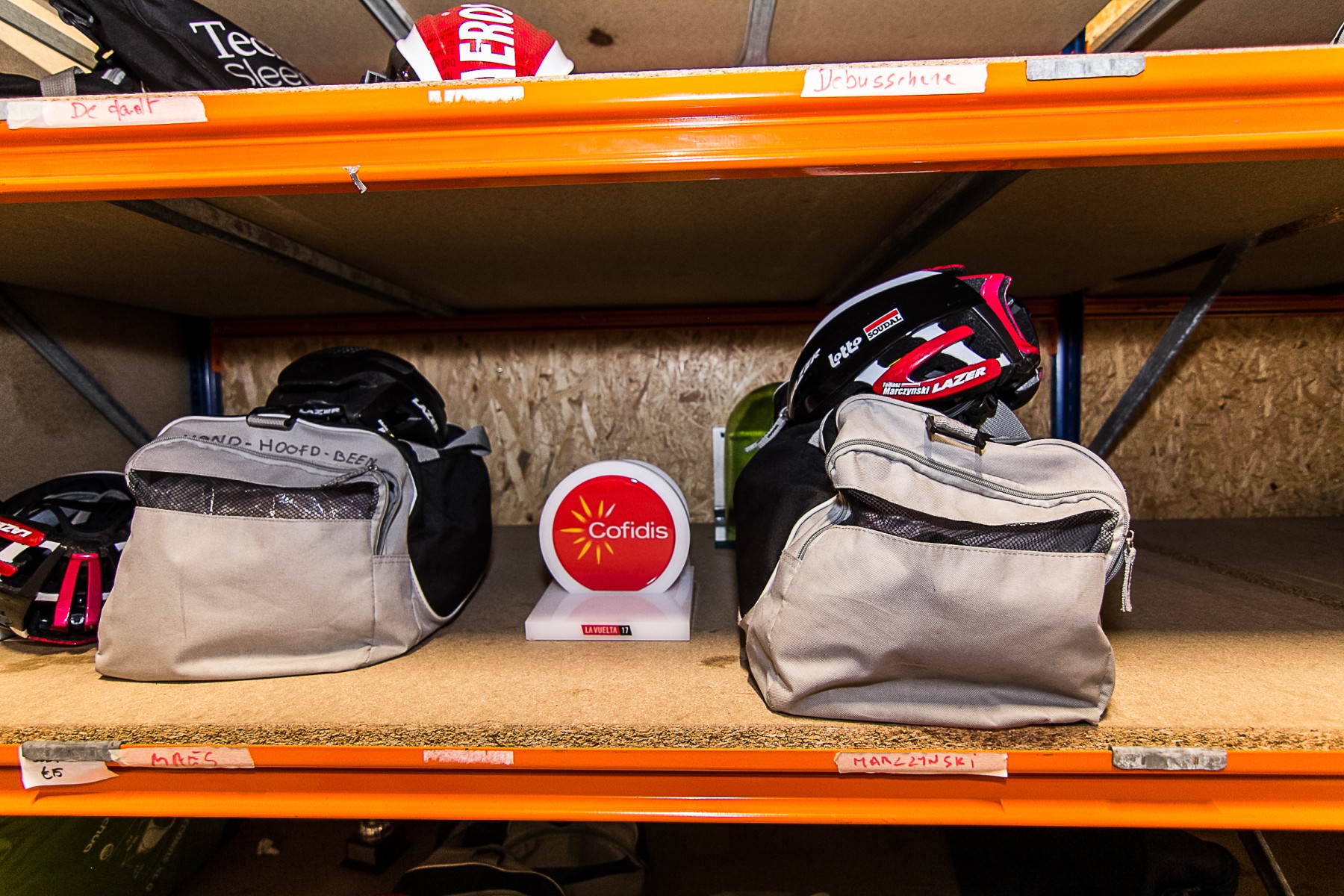-
 © Woud Demasure | KOERS
© Woud Demasure | KOERS
Buzze
The trophees Tomasz Marczynski received after his two Vuelta victories are waiting for the transfer to the living room of the Pole.
After a short search through industrial buildings, the right door to a hidden paradise finally opens. From the outside, nothing suggests where the Lotto-Soudal team is. Sarah Van Dingenen, responsible for marketing and hospitality, is welcoming us today. She has a few phone calls to make in the office and then the discovery tour can begin. "Today I am all alone here", Sarah tells us. "Normally my colleague Julia is here most of the time. She makes the car and staff planning, manages the intranet, keeps track of the stocks, passes on mutual agreements, and so on. She's our rock when it comes to administration and logistics."
Behind the office space lies the core of the service course. The left-hand section is mainly the working area for the eight full-time mechanics and the stockroom for bicycle frames, wheels and other parts. To the right is the other large area: the parking lot for the three buses, two trucks, the mobile kitchen truck, five small vans and fifteen team cars. Although the latter are hardly ever present. Scattered over the 1,000 square metres are the stocks of the carers, the medical room, the marketing corner and several storage rooms with shelves full of gear. Next to a sports bag, Tomasz Marczynski's trophies - given to him after his two recent Vuelta stage wins - are waiting to be transferred to the Pole's living room. Behind the service course there is also the service course of the women's and youth team, which is about half the surface.
Riders hardly ever come to the service course. "A cycling team flutters around," explains Sarah. "All the equipment is brought to the races by buses and trucks and the staff also lives to the rhythm of the races. Team-buildings, meetings, sponsor assignments; all that takes place at other locations. For example at sponsors' premises. It is mainly the mechanics who come here. This is, especially during the winter months, a busy beehive, because the new bikes have to be assembled from scratch. This means a few weeks of intensive assembly and consultation with the engineers of the research and development department of the suppliers. For the assembly of the electric groups, among other things, they come back for additional explanations and instructions about the new developments. Other busy days are the loading days before a major tour. Then, all the material intended for the aircraft has to be made ready. The internal communication for this is a hassle; a stressful period for Julia."
The cycling season is coming to an end. On the day of the visit the Sluitingsprijs in Putte-Kapellen is on the calendar and another part of the team is actually in China, for the last WorldTour race. "Now there is still a lot of material on the way to and from races. If everything would be back, there would be 125 bikes here, five per rider, three types. To give a few more figures: 160 pairs of wheels, 400 to 500 chains, 30,000 water bottles', Sarah lists smoothly.
The registration of the enormous quantities of gear is still done in a nice classic way via an Excel file and delivery notes. "This is not a high-tech warehouse with electronic scanning. I know that teams like Team Sky do that. But here, the follow-up goes without any noteworthy problems. So for the time being, there is no reason to start doing that. If everyone works accurately and with integrity, you save the costs of that software."
Every year the stock does expand. For example, the team recently added ice vests and mobile air conditioners to its ranks. The diet also continues to evolve: the riders currently eat a lot of nuts and seeds. But the most striking new item is whistles. The riders take them with them to the races in the mountains, to warn the spectators during the descents.
Herentals is an ideal base. Central in Belgium, easy to switch between Flanders and the Ardennes.
The warehouse is starting to get pretty full. But the team is not thinking of moving at all. "Herentals is an ideal base. Central in Belgium, easy to switch between Flanders and the Ardennes and for each of our Belgian riders the base camp is about the same distance from their home town. Our suppliers of cars and trucks are close by and bike manufacturer Ridley is less than half an hour away. So, nothing but advantages!
An upgrade of the existing industrial site to a dazzling visitor centre like the one at BMC Racing Team has been on the table internally. "Ideas are circulating within the team about a commercial expansion of the service course," Sarah reveals, "but the team is not ready for that yet in terms of budget. Fan engagement is important and we really want to create a community. For now, this is only done online; a museum or visitor centre are not yet on the agenda. Compared to a football team like Club Brugge or Anderlecht, which are strongly rooted locally, a cycling team has a much more global character and that makes it less profitable. A part of our history can be seen in the head office of the National Lottery. The shop runs exclusively via the web. Sales are negligible compared to the total turnover, but it brings in several tens of thousands of euros. So still worthwhile!
Perhaps it’s only logical that in 30 years working as an international news correspondent and a cycling correspondent, at one point or another this...

